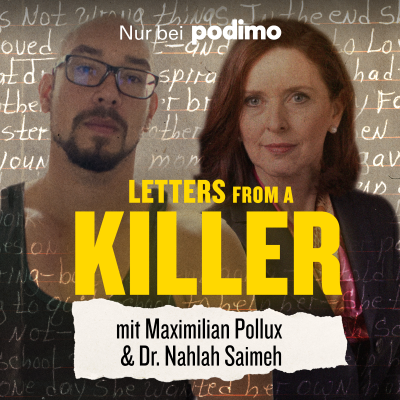
Plutopia News Network
Englisch
Kostenlos bei Podimo
Kostenlos hören bei Podimo
Starte jetzt und verbinde dich mit deinen Lieblingspodcaster*innen
- Vertraut von über 1 Mio. deutschen Hörer*innen
- Über 1.000 lokale Podcasts und Shows – nur bei Podimo
- Keine Zahlung nötig
Mehr Plutopia News Network
We talk to interesting people via podcast and weekly livestream.
Alle Folgen
337 FolgenKen MacLeod: Imagined Futures
Award-winning Scottish science fiction author Ken MacLeod [https://en.wikipedia.org/wiki/Ken_MacLeod] joins the Plutopia News Network to discuss his work’s political themes: failed modern systems, rising nationalism, and the struggle to find common interest in a fragmented world. He also reflects candidly on the craft of writing as he nears completion of his 21st novel, which he says still hinges on the hardest part: plotting and bringing a story to a satisfying, coherent conclusion. In conversation with hosts Jon, Scoop, and Wendy, Ken explains how he distinguishes science fiction from fantasy (material processes versus mental ones), describes his note-driven worldbuilding process, and weighs the real prospects for human space colonization, skepticism about today’s power-hungry “AI,” and the enduring pull of socialist ideas. > By far and away, the hardest thing for me to do is plot. You know, getting a general idea of the story, getting a world, an imaginary world, getting ideas. That’s easy, that’s the first stage. The thing I sweat and swear and stumble over repeatedly is plot. And most of the mental writing goes into that. At the moment I’m writing my, I guess, my 20th novel and it hasn’t got any easier. I’ve got a couple of chapters, maybe two or three chapters left to write. I’ve just re-read everything I wrote so far on the novel. It’s not quite as bad as I thought, you know. You get very critical of your work if you’ve read it several times over. Editor’s note: We realized after the interview that Ken has written 20 novels, and the one in process is his 21st! YOUTUBE VIDEO VERSION: The post Ken MacLeod: Imagined Futures [https://plutopia.io/ken-macleod-imagined-futures/] first appeared on Plutopia News Network [https://plutopia.io].
Adam Roberts: Fantasy
On this episode of the Plutopia News Network podcast, Jon, Scoop and Wendy welcome award-winning British science fiction novelist and literature professor Adam Roberts [https://en.wikipedia.org/wiki/Adam_Roberts_(British_writer)] to discuss his new critical book Fantasy: A Short History [https://bookshop.org/a/52607/9781350407824] and what it means to “suspend disbelief” in fantasy and science fiction. Adam explores how science fiction can be seen as a subset of fantasy rooted in modern scientific thinking, while fantasy is humanity’s default storytelling mode, stretching from ancient epics to Tolkien and beyond. He traces how genre fantasy crystallized as a recognizable category in the late 1960s and 1970s with Tolkien’s [https://en.wikipedia.org/wiki/J._R._R._Tolkien] paperback boom and publishing lines like Ballantine Books. [https://www.randomhousebooks.com/imprint/ballantine-books/] The conversation ranges across the Avatar [https://www.avatar.com/] films blending of sci-fi spectacle and mythic enchantment, the commercial and cultural drive toward endless sequels and mega-series (from Victorian triple-deckers to Star Wars [https://www.starwars.com/]), and the idea of fantasy as “re-enchantment” in a disenchanted modern world. The conversation is tempered by questions about grimdark [https://en.wikipedia.org/wiki/Grimdark] violence, romantic fantasy trends, fascism and authoritarianism in fantasy settings, and how technology, the internet, and AI may reshape imagination, community, and the ways people escape into (or build) alternate worlds through books, film, cosplay, [https://en.wikipedia.org/wiki/Cosplay] and video games. Adam Roberts: > But I think it may be that cinema is becoming more like video games. And it’s more about particular special effects, spectacular. That’s diminishing, I think, for the art form, because video games are necessarily structured by the obstacles that you put in the way of the player. The player overcomes the obstacles and gets to the end of the stage and beats the big boss. And that’s a rather kind of denuded way of thinking about the possibilities of storytelling. But then I also think that in a game like Skyrim [https://en.wikipedia.org/wiki/The_Elder_Scrolls_V:_Skyrim] you can do anything at all. You can fight dragons and you can go on adventures and quests, or you can just live in a village and explore what the possibilities of that are. And that’s rare. It’s rare certainly in cinema, but even in book form, where there usually is a more linear conflict that has to be overcome. VIDEO ON YOUTUBE: The post Adam Roberts: Fantasy [https://plutopia.io/adam-roberts-fantasy/] first appeared on Plutopia News Network [https://plutopia.io].
Dave Evans: Does It Square?
In this Plutopia News Network podcast, author and social media expert Dave Evans discusses the nature and spread of online misinformation and introduces Does It Square? [https://doesitsquare.com/], an AI-assisted fact-checking tool designed to help users pause, evaluate claims, and ground conversations in shared facts. Evans explains that misinformation is often “half true,” built on a factual core but extended with unsupported interpretations that exploit emotion, division, and engagement-driven social media algorithms. Drawing on his long experience with social media’s evolution, he argues that ad-driven platforms amplify outrage and reinforce echo chambers, while bots and click farms further accelerate false narratives for profit. Rather than declaring content simply true or false, Does It Square focuses on linguistic analysis — identifying emotionally charged, authoritarian, or intuition-based language — to encourage media literacy, reflection, and more constructive dialogue in a polarized information environment. Dave Evans: > One of the more interesting facts about misinformation is that it’s generally about half-true. In developing Does It Square?, one of the first scales that I implemented was how true, how false is this? And what I found was everything was basically 50% right, because really good information starts with some kind of fact that everyone agrees, “this is a fact .” But then it extends that in a way that either the data or the methodology doesn’t support. It makes some kind of unfounded claim. It makes no references to anything that supports those extensions or those interpretations or anything like that. So you’re left with — okay, if this underlying fact is true and here’s the interpretation of it, wow, I mean, I guess that’s, you know, true. Well, not really. Link to DoesItSquare.com [https://doesitsquare.com/] The post Dave Evans: Does It Square? [https://plutopia.io/dave-evans-does-it-square/] first appeared on Plutopia News Network [https://plutopia.io].
Living Philosophy
In this Plutopia News Network podcast, Charles Herrman [https://charlesherrman.substack.com/] interviews philosopher Randall Auxier [https://en.wikipedia.org/wiki/Randall_Auxier] about his unconventional academic path, process philosophy, and personalism, exploring how his early struggles with formal instruction led him to self-directed study and original interpretations of thinkers like Peirce, Whitehead, Bergson, Dewey, and Royce. Auxier critiques mainstream academia for discouraging originality and enforcing conformity, argues that philosophy is a way of life rather than a profession, and explains his view of “process personalism [https://en.wikipedia.org/wiki/Personalism],” in which personhood is relational, dynamic, and present throughout reality in varying degrees. He challenges individualism, defends communities as primary moral persons, critiques corporate personhood as sociopathic, and aligns his thought with pragmatism, radical empiricism, and process traditions that emphasize becoming, value, and shared meaning over static doctrines or institutional authority. Randall Auxier: > From the very beginning, I had difficulty finding teachers, and so kind of had to teach myself this stuff… and most people regard it as enormously difficult stuff. And so, in a way, it was a challenge to not have a teacher, and in a way, it was a blessing. Because if I had a teacher, I might have fallen into whatever that teacher thought about this material. Because that’s the natural thing to do, is to pay attention to your mentors and the people you respect. As it turned out, since I had no one to teach me this stuff — I mean, my professors were perfectly content for me to study it, but they said, you know, we don’t read this stuff. We don’t know what you’re talking about. And so I ended up having to sort of make it up, in the sense of make up my own interpretations of these people’s very difficult ideas. And that ended up being pretty good, actually, for me, because I don’t think that I would have been satisfied with anyone else’s version of this stuff. The post Living Philosophy [https://plutopia.io/living-philosophy/] first appeared on Plutopia News Network [https://plutopia.io].
Roy Casagranda: Reviewing 2025
Roy Casagranda [https://www.sekhmetliminal.com/]returns to the Plutopia News Network to help the hosts process what Scoop calls the “cornucopia of crap” that was 2025, ranging from social media’s corrosive incentives to AI hype, rising economic pain, and the destabilizing effects of Trump-era foreign and domestic policy heading into the 2026 midterms. Casagranda argues the U.S. is drifting toward an “electoral monarchy,” with a hollowed-out Congress and a Supreme Court increasingly empowering a unitary, executive-order-driven presidency, while the panel connects this to broader institutional decay, public cynicism, and a sense that global leaders are making irrational, self-destructive choices reminiscent of darker historical periods. They debate whether social media is the primary driver or merely an accelerant that converts frustration into addictive “hour of hate” posting rather than real-world collective action like organizing, boycotts, and strikes, and they trade observations about AI’s usefulness as a tool versus its dangers as an unaccountable decision-maker, especially as “AI slop” contaminates law, education, and public knowledge. The conversation also touches on crypto, energy-hungry data centers, and governance contrasts, with Casagranda describing Dubai’s future-oriented planning and service efficiency as a stark counterpoint to U.S. dysfunction, before closing on skepticism that the Democratic Party alone can meaningfully “rein in” Trumpism and a worry that the same cycle of backlash, complacency, and renewed crisis could repeat. The definition of monarch is one person rules. It’s not necessarily that it’s hereditary. So what the United States has basically done is — Congress doesn’t function anymore, and the Supreme Court is handing the power over to the presidency, and the president is ruling through executive orders. And so at that point, that’s the definition of a monarchy. You could have it so that you elect the monarch every four years. But the Constitution James Madison wrote us was meant for Congress to be in charge, not Congress to be the rubber stamp for the president. And that’s where we are. We’re in a situation where we have devolved into a monarchy. Osama bin Laden’s in his grave laughing his head off… like, wow, I triggered U. S. idiocy to the point where Americans can’t get their heads out of 911. And here it is, 24 years later, and they voted for this maniac who’s destroying the empire. He did more damage to the United States than could have been imaginable. Well, the United States did all the damage Link to Roy Casagranda’s podcast [https://www.buzzsprout.com/2532863/contributors/118587-dr-roy-casagranda] VIDEO ON YOUTUBE: The post Roy Casagranda: Reviewing 2025 [https://plutopia.io/roy-casagranda-reviewing-2025/] first appeared on Plutopia News Network [https://plutopia.io].















































